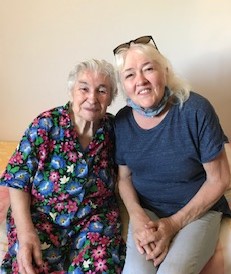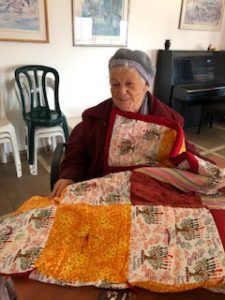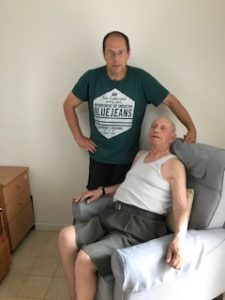by Susan Heagy
I’ve lost another friend. Someone I very much enjoyed visiting and talking with has passed  away Frida was 96 years old. Our conversations included her family, current events and her health. But she always eventually began to share portions of her war experiences. Grief and guilt would pour out while she spoke of family lost, missing, the abuse and starvation she suffered and using her wit to escape death. I greatly admired her. I loved her. And she always told me she loved me too.
away Frida was 96 years old. Our conversations included her family, current events and her health. But she always eventually began to share portions of her war experiences. Grief and guilt would pour out while she spoke of family lost, missing, the abuse and starvation she suffered and using her wit to escape death. I greatly admired her. I loved her. And she always told me she loved me too.
In between the lockdowns we were able to meet with Yelena. Age 87, she is rather spry and definitely animated. She likes to talk and told us how WWII affected her. Yelena was evacuated to a safe area during the war but experienced fear and loss  through that journey. She spoke quickly, desperately, fearful we would leave. She lives alone, no family around, and has been cut off from visitors during the lockdowns. Like Frida, as she spoke I could hear grief and loneliness in her voice. We gave her a quilt and she was thrilled. We promised to return after the current lockdown is over. She has more to tell and we want to hear.
through that journey. She spoke quickly, desperately, fearful we would leave. She lives alone, no family around, and has been cut off from visitors during the lockdowns. Like Frida, as she spoke I could hear grief and loneliness in her voice. We gave her a quilt and she was thrilled. We promised to return after the current lockdown is over. She has more to tell and we want to hear.
Nahum, a veteran, passed away last week at the age of 97. When we first went to visit him he was sitting on a folding lawn chair to watch TV. I almost cried when I saw him carefully sitting down or rising so it did not collapse. The same day we went to IKEA and  purchased an armchair that had a folding footrest. We took it to him the next day. He could not believe it was for him. Whenever we visited he spoke about the difficulty of fighting during WWII, the terrible conditions and not knowing if he would live or die. His voice would tremble with the fear he felt at that time. Though safe in Israel, he lived daily with that past. He would kiss my hand on arriving. I will miss Nahum.
purchased an armchair that had a folding footrest. We took it to him the next day. He could not believe it was for him. Whenever we visited he spoke about the difficulty of fighting during WWII, the terrible conditions and not knowing if he would live or die. His voice would tremble with the fear he felt at that time. Though safe in Israel, he lived daily with that past. He would kiss my hand on arriving. I will miss Nahum.
What do you say to a Survivor who came to Israel with 18 family members and she is now the only one left? When she calls to say she fell and broke her ribs, she has limited help and is confined to her third floor apartment; how do we respond? Crying on the phone with loneliness, fear and desperation… and she is not the only one. We know too many with similar situations.
Many years of visiting, hugging, helping and listening to Holocaust Survivors has taught us one particular thing- when they speak, listen for what they do not say. The unspoken is much louder than their regular chatter.
One of the biggest words sitting in their rooms, like the proverbial elephant, is the word “guilt.” Holocaust Survivors live with a deep sense of guilt.
“Why did I live and my sister died? It should have been me! She was the good one.”
“Why didn’t I stop the soldier from shooting my parents? It was my fault they died!”
“Why didn’t I do more to keep my family from starving?”
“I should have known to leave before the Germans came!”
Guilty. Almost nothing can convince them any differently. They carry the burden of family and friends who died and the 6+ million other Jews who were murdered. It is not a rational guilt. But it is a way to deal with the grief. Accepting blame gives a semblance of closure.
There are still over 150,000 Survivors in Israel. We contine to visit and maintain contact with those whome the Lord has given to us. How can we help them?
First of all, prayer. Sometimes it is all that is needed. After all, Yehovah is their Healer and their Abba.
Second, consistent and unconditional love, available and unwavering. Compassion touches the heart. Love conquers all. Amazingly simple, isn’t it? For many it is completely missing in their lives.
Third, affirmation. Yes, we love you. Yes, HaShem loves you. Yes, we are here if you need us. Finally, yes, you are free of guilt from your war experiences. No one at the age of 5 or 9 can be held accountable when adults are responsible for your loss. And yes, you may cry. It is okay.
And I cry with them. We are in this together.

